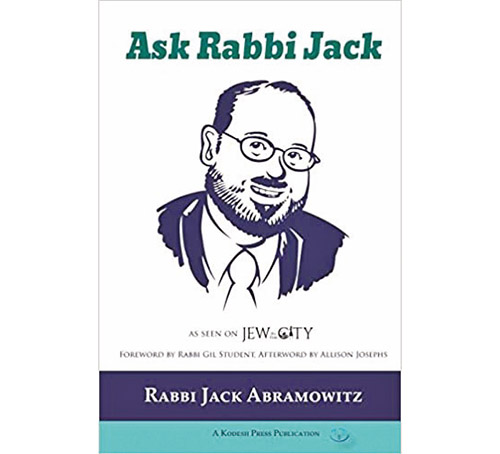
Reviewing: “Ask Rabbi Jack” By Rabbi Jack Abramowitz. Kodesh Press. 2020. English. Paperback. 296 pages. ISBN-13: 978-1947857469.
The term you don’t know Jack often means you don’t know what you are talking about. But in “Ask Rabbi Jack”, Rabbi Jack Abramowitz (Torah content editor at the Orthodox Union) shows that this Jack really does know his stuff when it comes to Judaism.
The book contains questions covering topics across the entire spectrum of Judaism, Jewish law, contemporary society, Torah and science and more. From Harry Potter, bacon in the messianic era, love and marriage and much more, Abramowitz never deflects and accepts and answers every question.
Abramowitz is a man of the world, knows the audience he is writing for and honestly answers these questions. He does not claim to speak for everyone and admits that his answers are not the only ones out there.
In the foreword, Rabbi Gil Student writes that Abramowitz offers a unique voice of sophisticated but accessible Torah for a broad audience. Abramowitz is no apologist and writes with candor, honesty and in a manner that is both respectful to the questioner, and with fidelity to tradition.
For example, when asked about the propriety of listening to rock music, he admits that he may be biased in answering, as that summer, he saw both The Who and Billy Joel in concert. This question was obviously asked pre-COVID. He provides sources for his approach and then does a hakira between the songs “Rock and Roll All Nite” by Kiss and a popular but problematic song by NWA that encourages the wanton murder of police officers, which he feels is unacceptable to listen to.
A fair amount of the book is fleshing out misconceptions about Judaism. From dispelling the notion that Jews can’t be buried in a cemetery if they have a tattoo (after explaining how Judaism views and forbids having a tattoo), ideas around keeping kosher, if Jews believe in hell and the afterlife and more.
One of the more interesting questions he covers is the halachic permissibility of the KonMari cleaning method. The KonMari method, created by Japanese organizing consultant Marie Kondo, is a method for tidying up your house and living spaces. While tidying up is undoubtedly a good thing, especially in the weeks now before Pesach, the KonMari method includes the belief in animism, which holds that all objects, places, and creatures have a distinct spiritual essence.
As part of this animism, the KonMari method suggests thinking about how your items feel, having an emotional state with them and if these items bring you joy. This question alone is quite complicated and touches on myriad different aspects of halacha. An entire book could, in fact, be written on this question alone. In the end, Abramowitz suggests bringing this question to one’s own spiritual advisor for an answer.
While many of the questions are from those without a Jewish background, many of them are fundamental questions that touch on Judaism’s very heart and soul and are entirely relevant to everyone. Abramowitz never makes the questioner feel stupid and validates their inquiry. His answers are intelligent, often humorous, respectful, yet never deviating from halacha or Jewish tradition.
And if you don’t know Jack (Abramowitz), you should really get to know him in this engrossing book. While this doesn’t have “Volume 1” in the title, I hope it is the first of many from him.
Ben Rothke lives in New Jersey and works in the information security field. He reviews books on religion, technology and science. @benrothke










